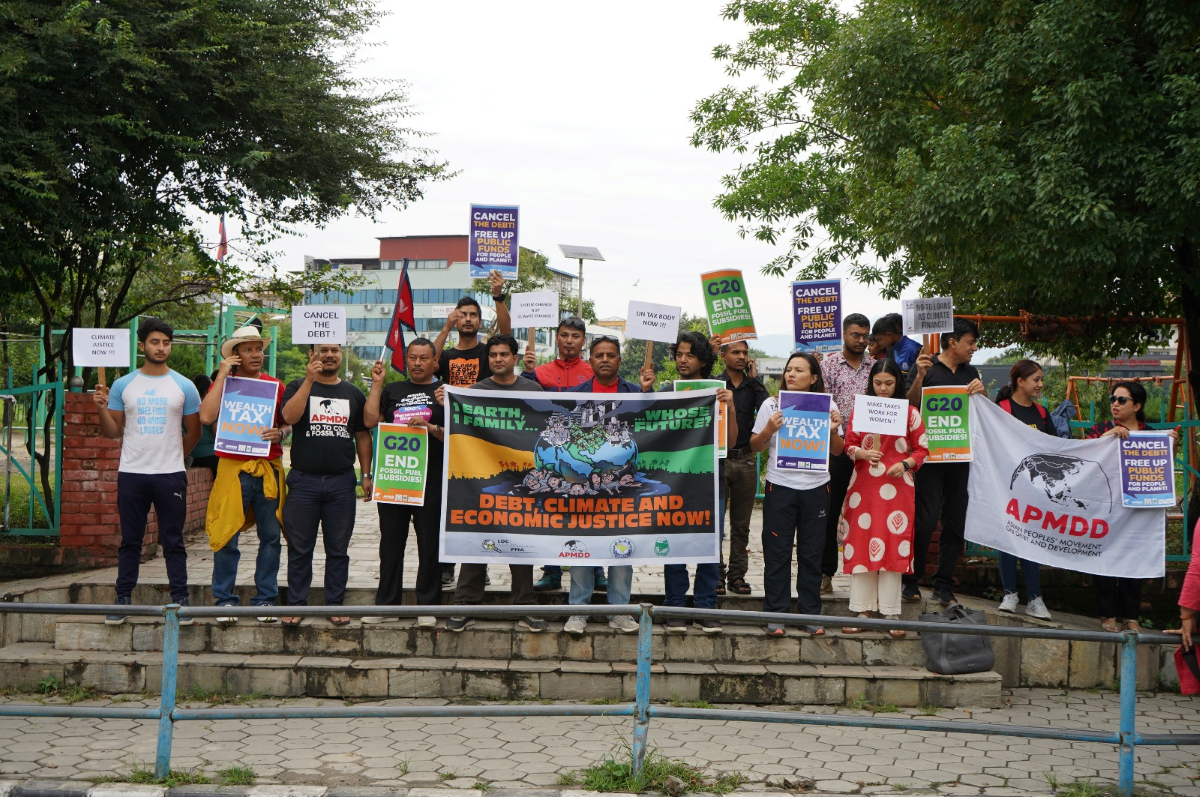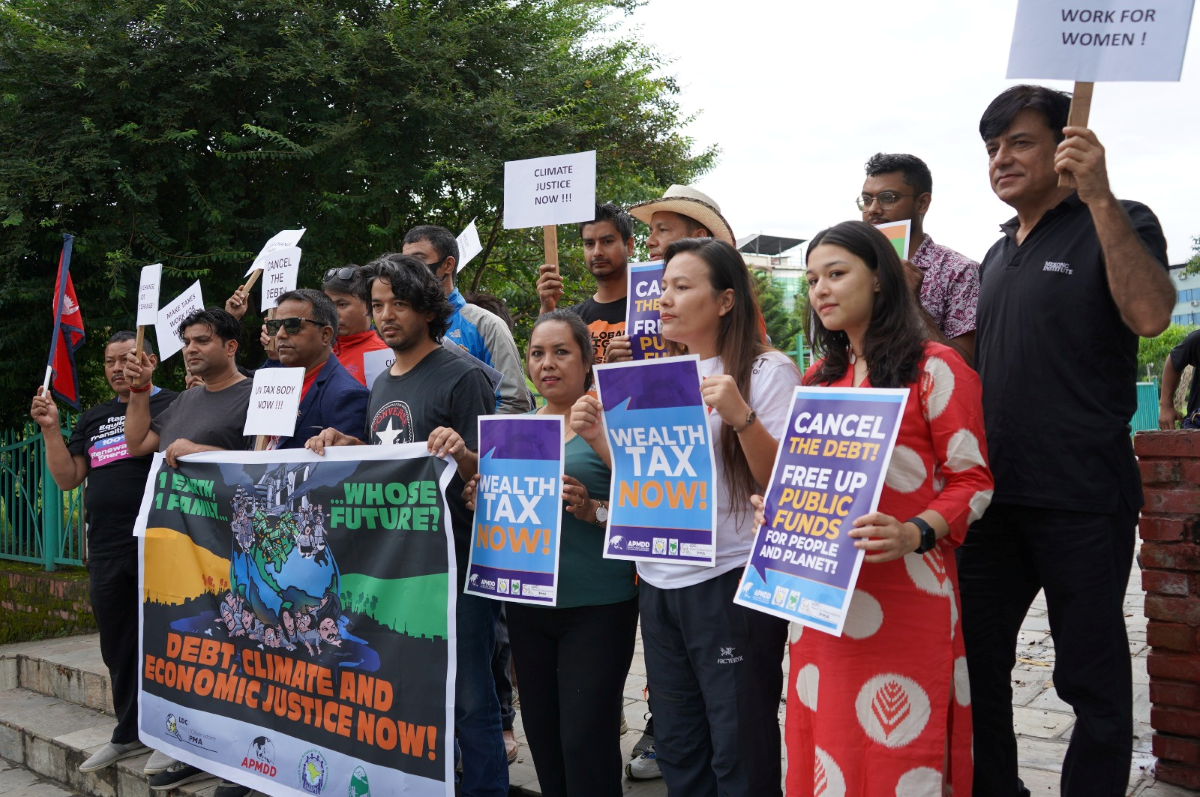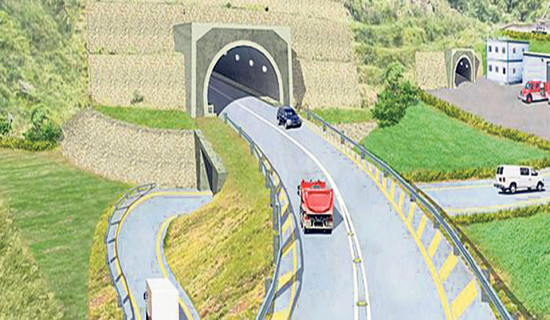- Sunday, 21 September 2025
Climate campaigners demonstrate in Kathmandu ahead of G20 summit
By TRN
Online, Kathmandu, Sept 8: Social activists and climate
campaigners gathered in Kathmandu today to protest and present their demands ahead
of the 2023 summit of leaders from the Group of 20 (G20) major economies.
Rural
Reconstruction Nepal (RRN) and LDC Watch and South Asia Alliance for Poverty
Eradication (SAAPE) were among the leading organisations that held the peaceful
demonstrations.
“We strongly urge the G20 to commit to concrete measures to
address the multiple crises faced by peoples of the Global South. As a
grouping, the G20 not only has massive resources, but also historical
responsibility for developing countries being mired in indebtedness, fossil
fuel reliance, extraction of natural resources and
exploitation of their peoples’ labor,”
said Lidy Nacpil, coordinator of Asian Peoples’ Movement on Debt and
Development (APMDD), according to the press release issued by the campaigner.
G20 countries together contribute to 75% of global trade and almost 85%
of the world's GDP. These countries also account for 80% of
world power sector emissions, with per capita CO2 from coal power at 1.6 tons in 2022, up from 1.5
tons in 2015 and significantly higher than a global average of 1.1 tons.
The two-day summit, hosted by India in New Delhi on September 9 and 10 will discuss pressing global issues, including climate change, clean energy transition, and tackling poverty. The meeting will bring together leaders of the 20 member states and delegates from 40 countries.

Fossil Fuel phaseout
and climate finance
Nacpil
called on the G20 to end fossil fuel subsidies and financing and to commit to a
rapid, just and equitable transition to renewable energy systems. “We
reject any agreement on curbing
unabated use of fossil fuels by installing Carbon Capture and Storage on existing
coal plants. The promotion of the use
of CCS technology to reduce emissions to zero by 2050 is a scam to delay the
phaseout of fossil fuels. We likewise reject carbon offsets, carbon capture and storage, geoengineering, hydrogen and
ammonia co-firing as false solutions to the climate crisis,” Nacpil said.
Despite a 2009 commitment to phase out and rationalize over the medium
term inefficient fossil fuel subsidies, the G20’s
support to produce fossil fuels and fossil fuel subsidies increased in 2021. Subsidies have continued to rise
into 2022. G20 fossil fuel subsidies of at least USD 55
billion per year in oil, gas, and coal projects are almost twice the support provided
for clean energy, which averaged only $29 billion per year.
Nacpil said G20 governments must also commit to shift their fossil
support to clean energy. According to the International Energy Agency (IEA),
tripling renewable energy capacity (RE) by 2030 is crucial to achieving the
Paris Agreement’s goal of keeping below 1.5C of global warming. But a G20
commitment to triple RE capacity by 2030 failed to get an agreement due to
issues of financing, accessibility and technology.
As one
of the organizers, representative from Rural Reconstruction Nepal (RRN), Dr.
Suresh Tamang called on the G20 to “immediately deliver new, additional and
non-debt creating climate finance much more than the unfulfilled $100 billion a
year pledge.”
Major
climate and weather events in developing countries in 2022 caused more than US$109 billion
in losses. The amount of loss and damage
financing needed is estimated to be more than US$400 billion per year and this
amount will have to be revised upward over time, according to research.
Five G20 countries do not
deliver their fair share contribution to the $100 billion climate finance goal annually. The
UK, Italy, Canada, and Australia fall short while the US only contributed a
small fraction (5%) of its calculated annual fair share.
“The
Global South needs and is justly entitled to way more than $100 billion per
year in climate finance based on equity and fair shares. G20 governments responsible for excessive levels of carbon
dioxide emissions also have an obligation to pay reparations for the losses and
damages suffered and faced by those in the Global South, the least responsible
for the climate crisis,” said Dr. Tamang from Rural Reconstruction Nepal
(RRN)
Call for debt cancellation
“We urge G20 governments to
cancel the debt for all countries facing a debt crisis, including public debts
of a questionable and fraudulent nature that violated human rights and
contributed to exacerbating the climate crisis,” said Sadhikshya Chauhan, an
activist..
Chauhan said the G20’s Debt Service Suspension Initiative
(DSSI), limited to less than half of developing countries, has
proven grossly inadequate in matching the depth and breadth of the debt crisis.
Its successor, the Common Framework for Debt Treatments beyond DSSI, fails in
providing debt relief and still frees the private sector from
responsibility, enabling bailouts with new loans from multilateral
institutions.
According
to a new report, the pressure to repay debts is forcing poor nations to continue investing in
fossil fuel projects to make their
repayments.
Call on the G20 to stop blocking a UN
Tax convention
“We call
on the G20 leaders to stop blocking progress towards a UN Tax Convention. It is
a long standing demand of developing countries that the G20 and OECD have, time
and again, stalled. We need a tax deal that centers the needs and concerns of
the peoples of the Global South,” said Sudhir Shrestha, from South Asia
Alliance for Poverty Eradication (SAAPE), a regional alliance whose secretariat
is based in Kathmandu, Nepal
Shrestha
said the G20 and OECD agreement to implement a global tax deal
reinforces, rather than weakens, the ability of multinational corporations to
cheat Global South countries of wealth created within their borders through
extraction of their natural resources and exploitation of their peoples’ labor, according to the press release.
Pillar
One of the OECD’s Base Erosion and Profit Shifting (BEPS) Framework hands the
right to tax excess and non-routine profits of multinationals to countries
where these corporations are based, rather than where their assets and manpower
are located. Pillar Two sets a minimum global corporate income tax (CIT) rate
of 15%, much lower than the current global average CIT rate, which is 25%.










-original-thumb.jpg)


-original-thumb.jpg)
-original-thumb.jpg)
-original-thumb.jpg)
